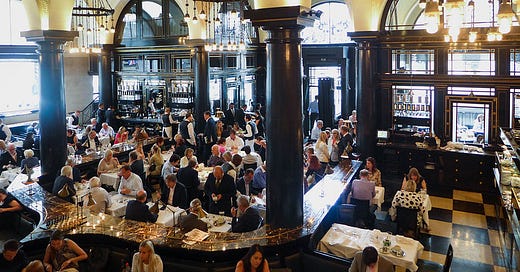Is this the end for one of London's most beloved institutions?
The battle for the soul of The Wolseley

Last week, the restaurant firm Corbin & King was ‘plunged’ into administration (because you don’t just ‘go’ into administration, you ‘plunge’ into it, or you at least ‘fall’).
Why should you care about this? Well, Chris Corbin and Jeremy King own The Wolseley and eight other restaurants, including Brasserie Zedel in Piccadilly and The Delaunay just off the bottom of Drury Lane. They are the kind of classic, high-end cafe-restaurants that tourists can’t get enough of, but that Londoners feel quite attached to as well.
Not long after we moved to London we were treated to a birthday lunch in The Wolseley by a generous friend. It felt very much like stepping into some sort of time capsule. Not ‘old fashioned’ as such, more like ‘classic’ or ‘unspoilt’. Sure, there was the faintest whiff of Jacob Rees-Mogg’s ‘nanny's homemade marmalade on toast’ to the place, but there was none of JRM’s oily superiority or snobbishness. If anything, it felt like a place where everyone was made to feel welcome. Where anyone could enjoy the deft care, calming civility and understated decadence that you might assume would only be on offer to the privileged few (the prices at The Wolesley have always been ‘accessible’ and Jeremy King is fond of describing his restaurants as ‘egalitarian’).
In June of last year, as the Wolseley tentatively reopened, the chef Ravinder Bhogal wrote about his love of the place for the Guardian. Strangely for a chef, he spent more time praising The Wolseley’s ‘feel’ than he did it’s food:
“Founders Chris Corbin and Jeremy King are architects of ambience and exerted every energy into creating a restaurant as close to perfection as you can get. The light fixtures, the height of the tables, the temperature, the acoustics – every piece of glassware and crockery has been pored over. There’s the impeccable culture of hospitality: people who remember your name, who are poised to spot an empty glass from across the street, who ask after your children or your dog as they bring you complimentary warm bread with lozenges of salted butter. It was here that I learned the most valuable lesson for any fledgling restaurateur: running a restaurant is ultimately about the business of doing pleasure. Good food and fancy interiors aside, it’s about how you make your guests feel.”
Even if you’ve never eaten in a Corbin & King restaurant it’s hard to deny that London would be a lesser place if it lost them. So is The Wolseley about to disappear along with all its sister restaurants?
This is where it gets a bit complicated, so strap in.
A short history of some of London’s most iconic restaurants
In 1981 the designer Joseph Ettedgui hired Corbin and King to help with his takeover of a faded restaurant in St James, called Le Caprice. They did such a good job that Princess Diana became a regular and so did Mick Jagger (Jeffrey Archer famously chose to eat his first meal there when he got out of prison, but you can’t win them all).
After that the pair moved on to another restoration project. The Ivy had closed in 1989 but Corbin and King bought it the following year, totally renovated it and turned it into… Well, they turned it into ‘The Ivy’.
In 1998 the pair repeated the story with J Sheekey and in the same year decided to sell their company, Caprice Holdings, to the Belgo group (yep, the moules frites people - there’s a whole story there too, but we don’t have the space to get into that right now).
Corbin & King remained as non-executive Directors of the company up until 2002 when, as they were researching sites for a hotel project, they came across the former Wolseley Motors building at 160 Piccadilly and had the idea to turn it into an all-day brasserie-restaurant. The Wolseley opened in 2003 and very quickly became one of the most successful and beloved restaurants in London.
That was it for quite a few years, until eight years later they went on a bit of a tear, launching The Delaunay in 2011, Brasserie Zédel and Colbert in 2012, Fischer’s in 2014, the Bellanger in 2015, and Soutine in 2019.
Meanwhile the entrepreneur Richard Caring (who has teeth that rival Rylan’s and hair that has its own Twitter account) was trying to convince the Caprice restaurant to provide the food for the golf club he’d just bought. When the negotiations stalled, he got impatient and just bought the entirety of Caprice Holdings for £31.5m.
This is important because Caring is going to come back into the story later on, but for now just know that if you’ve eaten out in London in the past 15 years then you’ve probably been in a restaurant belonging to Richard Caring. Over the years he’s owned at least some of the Strada and Belgo chains, as well as Carluccio’s, The Rivington Grill, The Tramshed, Sexy Fish, Bill’s, Café Boheme, Dean Street Townhouse and most of the Soho House group.
Mo money, mo problems
In 2017, Corbin and King repeated the pattern they’d established in 1998 and sold the majority share in their restaurant group to a Bangkok-based hotel group called Minor Hotels. This is where the problems begin.
If you click on that last link you’ll see the following sentence: “The timing of the deal is interesting, as many restaurateurs have reported some of the most difficult trading conditions of their careers, with rising rents, rising costs of imported ingredients and staff shortages all adding salt to the wound.”
If only they knew…
Just three years later, Covid struck and Corbin & King’s sales fell 58%, pre-tax losses went from £4.9m in 2019 to £10.3m in 2020, and their turnover almost halved.
When Minor bought its 74% stake in Corbin & King, part of the £58m they put in was a £20m loan which is due to be repaid in 2024. They also covered a £13.25m loan that Corbin & King owed to HSBC that was due to be paid in May 2020. All in all, it’s reported that Minor has lent £38 million to Corbin & King over the years.
It doesn’t stop there. Corbin & King have also been fighting a lawsuit worth about £4 million with Axa Insurance “after the company failed to pay out on claims linked to the coronavirus lockdowns of 2020.”
Oh, and we shouldn’t forget their Russian-born, Belgian oligarch landlord who tried to evict them last summer.
This is where it all goes a bit ‘Succession’
At the start of last week Minor said that Corbin & King had been “unable to meet its financial obligations” and had declined “repeated proposals to recapitalise the company”. As a result, Minor said they had “no other viable option than to appoint administrators”.
On Thursday, Jeremy King took to YouTube to issue a statement, saying that the move was an “attempt to seize control of the company” that the company was solvent, that it was “business as usual”, and the refinancing proposals they had been offered were only advantageous to Minor.
So now begins the battle for Corbin & King.
On the side of Corbin & King is the American investment fund Knighthead Capital, who have offered to repay the £38 million in loans and effectively ‘save’ the business.
On the other side is the ‘restructuring firm’ that Minor have called in, FRP Advisory. They have apparently already “received 35 to 40 expressions of interest”. One of those expressions is from the aforementioned mahogany magnate, Richard Caring, who had apparently been sniffing around the Corbin & King group even before this all kicked off.
And this is where we get to the nub of this whole mess. Because this isn’t really about Corbin & King’s debt or their solvency. It’s about an attempt to take control of the Corbin & King ‘brand’ (and the Wolseley’s status in particular) so it can be fed into a global merchandising machine that will create dodgy copies of the original that can then be franchised into the ground.
In short, this is about the Salt Bae-ification of The Wolseley.
We know this because that’s what exactly happened to The Ivy.
Since buying it, Caring has attempted to take the carefully bottled Ivy magic and spread it as thinly as he possibly can. There are now something like 30 different restaurants in the Ivy Collection and they are, by all accounts, not up to scratch (and that’s putting it nicely).
But they’re not just crappy fascimiles. Over the past few years Caprice Holdings has also been on the receiving end of a number of accusations from staff that include harassment of junior workers, criticism of the way it distributes tips and allegations around worker safety during the pandemic.
Then, last year, came the Ivy Asia promotional video.


Laden with more racial stereotypes than a Freddie Starr routine, this atrocity of a video was widely condemned, but the mealy mouthed ‘apology’ which came shortly afterwards didn’t appease many. Jay Rayner summed it up nicely when he tweeted “The knuckle draggers behind the dismal Ivy Asia Chelsea promo video have decided they were merely naive and insensitive rather than, yknow, up to their arm pits in premeditated racist stereotyping from front to back of house.”
Caring’s company promised to conduct an ‘internal review’ and ‘educate’ themselves after that debacle. But that doesn’t negate the fact that this is what happens when you take a finely tuned mechanism and rip it apart in order to outsource each of the component parts to the lowest bidder, so you can then squeeze every last penny out of its hard-earned reputation.
Jeremy King has said repeatedly over the past few weeks that Minor have always wanted nothing more than to open mini-Wolseley’s in all 500 of their hotels, but he just wasn’t interested in doing that. Apparently he got “very good reassurances” that this wouldn’t happen, and negotiated “extremely good control rights over the company” so that “nothing could be opened and none of the names could be used without my consent.”
The problem is that the Devil doesn’t need consent if he’s holding a £38 million IOU in his hand.
News bits
An investigation into the conduct of Met officers at Charing Cross police station has uncovered evidence of “bullying, violence towards women, perverting the course of justice… racism, misogyny, harassment and offensive social media messages.”
Last year City Hall was granted £3.46 billion to deliver around 30,000 new affordable homes over the next five years. But just 1,673 affordable homes were started between April and September 2021. On Friday the mayor blamed the “twin effects of the pandemic and Brexit” for the delay and asked the Government or more funding and a temporary visa scheme for construction workers.
Porters, cleaners and catering staff, at St Barts, Royal London and Whipps Cross hospitals are going on strike for two weeks. The union Unite claims that the “mainly black and Asian staff are paid up to 15% less than directly-employed NHS workers.”
Meanwhile, Woolwich Ferry staff have begun a three month strike over claims that TfL has victimised employees and undermined workers with temporary agency staff. They are also “calling for a pay rise for the lowest paid ferry staff”.
Consultancy firm EY published a report this week that says the “levelling up agenda will hamstring the UK economy if it moves business outside of London” and that “choking London’s contribution to the British economy would deliver a heavy blow to the UK’s recovery from the Covid-19 crisis.”
The press are seeing the fact that Diageo is planning to build a £73m Guinness microbrewery at Old Brewer’s Yard in Covent garden, as a positive sign for London’s hospitality industry. In related news, apparently one in ten pints ordered in London right now is a Guinness.
The Face sent the Fence Magazine to Frieze Art Fair to do some people watching. Choice quote: “In some ways, Frieze acts as an oligarchical corrective to the city’s disjointed planning history: it’s a utopia imagined for the super-rich. In a fitting tribute to history, its location is in Regent’s Park, a space proposed by George IV, a gluttonous spendthrift whose one redeeming feature was his patronage of the arts.”
And while we’re on the subject of Richard Caring’s restaurant empire. In the news this week was the woman who nearly got charged £268,399 for her meal at Cote Brasserie… And inadvertently gave here PIN number away to everyone reading about it.







